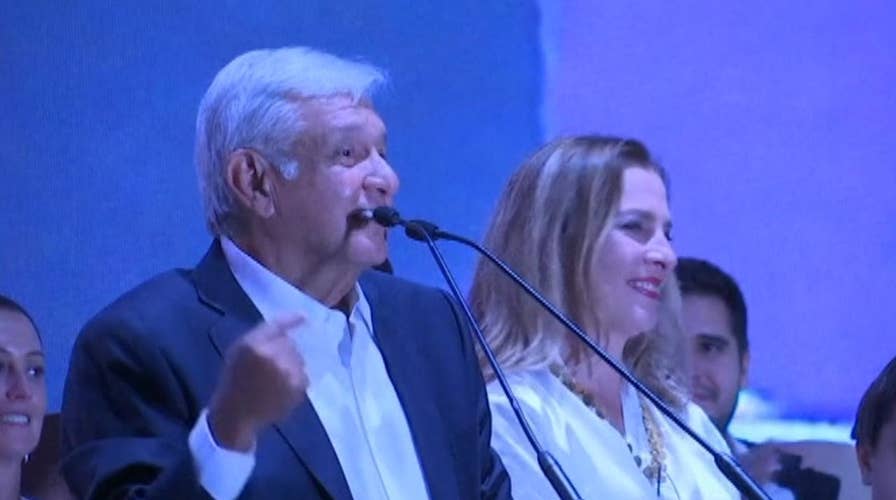Who is Mexico’s President-elect Andres Manuel Lopez Obrador?
A look at the policies of Mexico’s President-elect, Andres Manuel Lopez Obrador, and what they could mean for the U.S.
Following his landslide victory in Mexico’s presidential election Sunday, leftist candidate Andrés Manuel López Obrador – known by his initials as AMLO – is preparing to assume office Dec. 1. What will happen then?
Will AMLO join the wave of Latin American leftist populist leaders who brought disastrous consequences to the people of Venezuela and Nicaragua? Or will he follow a moderate path in line with successful social-democratic experiences in Chile and Uruguay?
This question has important implications for the U.S. and the region. Not only does Mexico share a border with the U.S. – it is also the second-largest economy in Latin America and the 15th in the world. If AMLO follows the wrong path, the consequences for the U.S. regarding migration, trade, investment and security cooperation would be severe.
At first glance, the election results would point to drastic transformations. If current projections hold, AMLO and the parties in his electoral coalition will not only have captured the presidency, but also a majority in both houses of Congress. For the first time in 21 years, the president will also control the legislature and enjoy a broad mandate after obtaining more than half the vote and 30 points more than the closest of three other competing candidates in the election.
The incumbent party, the PRI – which has governed throughout most of modern Mexico’s history – was decimated in the election and will be a shadow of its former self in Congress. The right-of-center PAN has also experienced a major defeat. Although AMLO will likely fall short of the two-thirds majority required for constitutional changes, the opposition to his government will be fragmented and severely weakened.
Further, Sunday’s results can be interpreted as a broad mandate for change. At 24 per 100,000, the homicide rate is at its highest in Mexico’s modern history. Economic growth has been extremely mediocre over the last 25 years (about 1.2 percent per capita yearly). And rampant corruption has placed Mexico among Latin America’s most corrupt countries, according to Transparency International.
After giving opportunities to two established parties in previous elections, Mexicans have expressed a strong desire for a course correction.
Although the mandate for change is accurate, however, there are good reasons to expect AMLO’s government to follow more a moderate, social democratic path than the far-left Hugo Chávez did in Venezuela:
AMLO is not a political novice or outsider. After running in three presidential elections and serving as the mayor of Mexico City, he has learned the value of political pragmatism and the importance of broad electoral coalitions.
This time around he has incorporated leaders from across the political spectrum among his supporters and has even formed an electoral coalition with a socially conservative, evangelical party. Many of these leaders are the same people who have governed Mexico since the transition to democracy in 2000, so they should not be expected to become drivers of drastic change.
In addition, several structural constraints make drastic changes in Mexico difficult. For example, the bilateral commercial relationship that grew out of the North American Free Trade Agreement (NAFTA) has become so important for Mexico that any departure from it would be painful.
After his electoral victory, AMLO reiterated his commitment to preserving NAFTA and continuing talks to modernize the agreement. Although two nationalist presidents in Washington and Mexico City are likely to complicate negotiations, they already share a common vision for improving labor conditions south of the U.S. border through higher wages.
Ironically, it might be in America’s best interests to preserve the "NAFTA straightjacket" on Mexico's next president.
On top of this, both the U.S. and Mexico depend on each other considerably for homeland security and bilateral cooperation that will be difficult to dismantle. The U.S. has relied on Mexico's immigration cooperation, including its policies toward Central American migrants seeking to reach America. At the same time, Mexico has become dependent on U.S. intelligence to fight organized crime, which is the top priority of the Mexican people.
Finally, over the last two decades, power has become less concentrated in the Mexican president’s office and increasingly in state governments and Congress. Although the president’s coalition will enjoy a majority in Congress, the diversity of interests that came together behind AMLO’s victory will require watering down any major policy changes to find common ground among different interests represented.
This does not mean that continuity in U.S.-Mexico relations will be automatic or that it will be smooth. AMLO and President Trump are likely to disagree on many important issues. However, even if AMLO tries to adopt major changes in bilateral relations, he will run into many of the same obstacles Trump has encountered on the U.S. side. Decades of bilateral cooperation are difficult to undo by fiat.









































